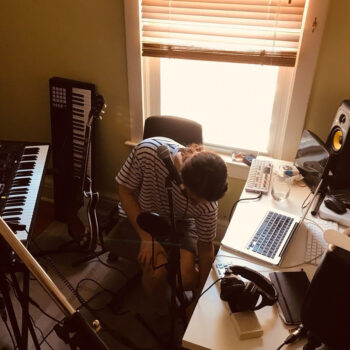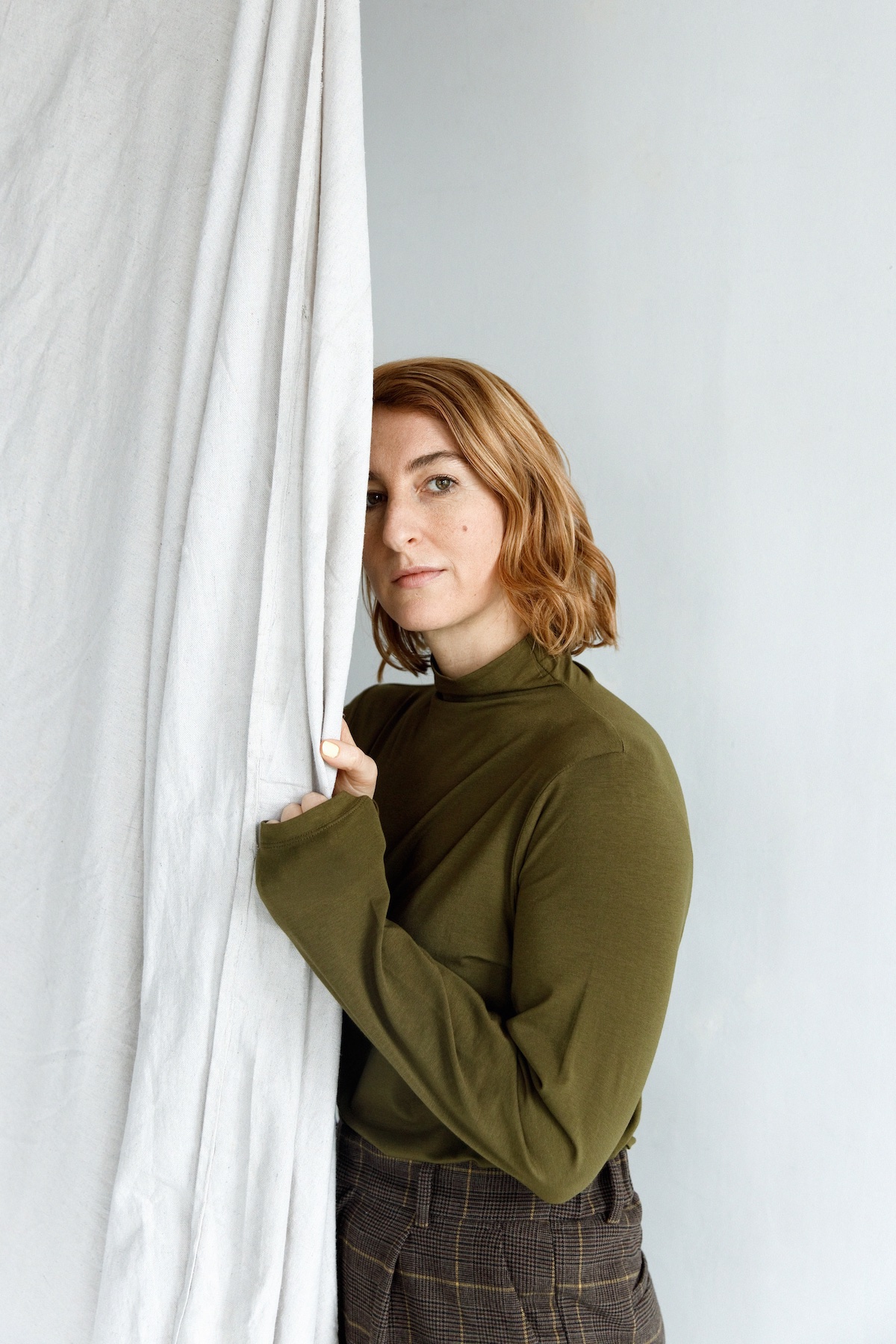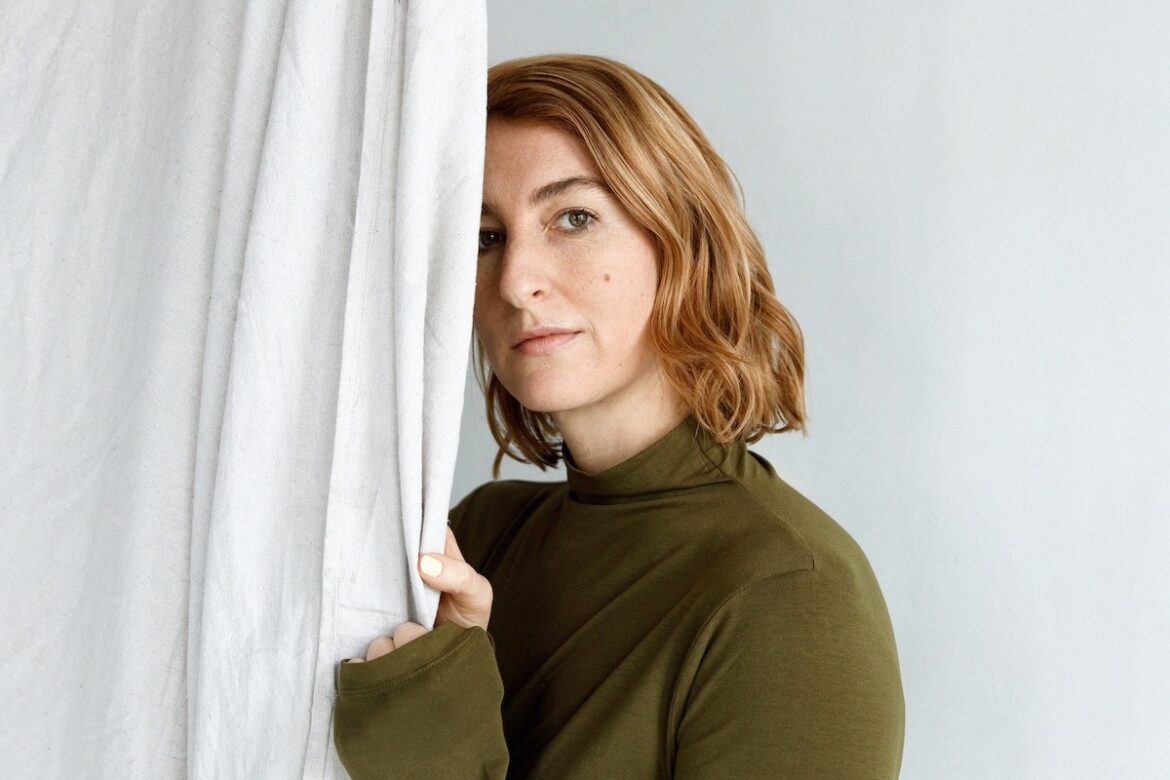The follow-up to the Aaron Dessner-produced ‘All That Emotion,’ ‘I’d Be Lying If I Said I Didn’t Care’ finds Vancouver’s Hannah Georgas exploring textures both dazzling and pensive that underscore her sharp, self-deprecating lyricism.
‘I’d Be Lying If I Said I Didn’t Care’ – Hannah Georgas
And this happens at least once, if not two, or three times a year, especially in recent years – when I make the commitment to write about an album and even in my process of taking notes on each song, creating a very rudimentary outline of what I would like to discuss within the piece, and, like, determining my “way in” – what the conceit will ultimately end up being if I am able to pull it all off – regardless of how much preparation I do, I find that I reach a point where I believe myself to be in over my head with just how many flimsy strands I intent on grabbing ahold of and pulling together, and wondering if it is even worth it to be that ambitious.
If it’s even worth it to take what could, and perhaps in some cases, should be a more straightforward or, at the very least, less meandering review of an album, and continue insisting to myself that I turn it into a personal essay that happens to be about music, but will also most certainly be about my fragile mental health, or something else that I should just save for therapy.
I reach a point where I begin succumbing to the weight, or the pressure, that only I am putting on myself with it – where I get, say, 3,000 words and change in and want to scrap it all; or, I begin a second draft, exhuming bits and pieces from the first, but quickly realize how unhappy I am with that one as well.
How many flimsy strands, or narratives, do I intend to grab ahold of and pull together, hoping I can carry it all through until the end, and it’s worth it to be that ambitious, and that the story I ultimately want to tell is one worth telling, and worth being heard.
Where do I start, then.
Do I start with what is happening now, in this moment? Or do I go back to what could be referred to as a beginning?
Or do I start with something else entirely?
I spend a lot of time thinking about my relationship with others—those whom I am the truly the closest to, and my relationship to music, and how there is a place where those things inevitably intersect.
People can find their way into our lives at what you understand—maybe at that moment, or maybe later on, is the right time, or the time when you needed them the most, and you take them with you. And in moving forward together, you do so with an appreciation and admiration, yes, but also with this imagined uncertainty of what you might have done, or who you might have been without their presence in your life.
Specific artists, or even just certain songs, can arrive in your life at the point where it will make the most sense to you, or will resonate the hardest, or most personally—and then you go on to take those with you as you grow, like how we carry one another through time.
Go back to what can be referred to as the beginning.
And we were standing outside of the building. And it was cold. Mid or late October, and the chill in the breeze tore through the flannel shirts we were both wearing, neither of us thinking to put on our coats. And she was my co-worker then—a colleague, and outside of work, we had become close friends through working together through the first seven months of the pandemic had certainly created strains, or had magnified any underlying apprehensions that already were there in both our personal and professional dynamics.
And I had gotten myself in trouble, again, at work.
And this was maybe the second or third time this had happened in a relatively short amount of time. Morale, among the staff, was incredibly low; tensions within the building had reached a breaking point, and the ease with which I could become irritable or lose my temper was higher than it really should have been.
My mental health was, as you might expect, given the circumstances, the lowest it had been in a number of years.
And I had gotten myself in trouble, again, at work. Rolling my eyes at the wrong person or having said something to someone in a candor or tone they did not appreciate. I was never given specifics of what, precisely, I had done or who I had gone on to upset or offend. Nobody had, at any point, bothered to approach me directly and ask why I was acting, or behaving, the way that I so often was at that time.
Nobody had approached me directly to ask if I was okay.
The answer would have been no.
I was not doing well. I hadn’t been for quite some time, and I know that didn’t, and still doesn’t, make me a unique individual, especially when a number of other people around me were also really struggling.
But I was not doing well, and it was so disappointing that nobody could see that.
My colleague – my friend, she would be the recipient of an email from someone higher up, and it would, more or less, say that I was a problem that needed to be solved. The email would ask what she was going to do about it—what she was going to do about me.
“I got another email about you this morning. You want to tell me what happened this weekend,” she asked me on a Monday morning shortly after she had arrived in the building. Her voice, already tired. Her tone sympathetic, sure, but also beyond exasperated with both the circumstances we found ourselves in, and with me.
She’s hauled me outside of the building for this conversation. We’re standing far apart—more than six feet. Both still wearing our masks. It’s cold. Mid or late October, and the sun is still rising, and the chill in the breeze is tearing through our flannel shirts. I tell her that I am trying as hard as I can, but I am not doing well. She is doing her best to be patient with me, and I don’t know how else to make her understand what has been on the tip of my tongue for so long, so I just end up saying it—making a confession that I, perhaps, shouldn’t have, but if I hadn’t, it would still be an unnamed feeling that for the last three years, I would have continued lying to myself, and others, about.
I tell her that I am trying as hard as I can, but that I am not doing well, and that I am so unhappy. I am the unhappiest I have been in a long time, and things feel so dark, and so fragile, that I have been pushed to the point where, when I wake up, every morning, my first thought is, “I do not want to be alive.”
And when I tell her this, I realize what I have said, and that it is the first time I have ever vocalized to anyone.
It’s called “chronic passive suicidal ideation,” and it is exactly what it sounds like.

*
Start with what is happening now, in this moment.
Almost exactly a year ago, I found myself writing about the things we let go of.
We no longer work together. We haven’t for around two years. And last autumn, my former colleague, and close friend had decided to relocate—not far. Not really—not out of the state even. But far enough that we would not see each other with the same frequency that we had fallen into, and so her decision to move was something that was certainly going to change, or shift, the dynamic we had up until that point, but the extent to which it would change was, at the time, an unknown.
But I understood, as best as I was able to, that there would, in fact, be a shift, or a change.
I think I understood that, anyway.
And her decision to move shouldn’t have been a surprise to me—it had, in fact, been a possibility for a number of years leading up to this moment when it was, somewhat unceremoniously announced while I am standing in my kitchen, making us lunch.
It was no longer just an idea, or a desire, or a want.
Or a need.
It was happening.
I should not have been surprised, yes, but regardless of how much time, or how many years, I had to ready myself for what was presented as the inevitable, it does not make the act of saying goodbye—specifically for what has become a much longer amount of time than I had, perhaps foolishly, anticipated, any easier to accept, or to do.
Almost exactly a year ago, I found myself writing about, among other things, out of need more than anything else, the things we let go of, and I lost my mind, somewhat, in the process, trying to grapple towards a reluctant acceptance that people change, things change, and we ultimately have to let go—specifically, we have to let go of a person who was never really “ours” to begin with.
Last year, in the late summer, well before the announcement of First Two Pages of Frankenstein, and as they were about to embark on a late summer tour to road test newly written material, The National released the one-off single, “Weird Goodbyes,” featuring guest vocals from longtime friend of the band Justin Vernon.
The song itself didn’t make the final cut for the album—something I was, at first, disappointed to learn, but maybe it is for the best that it was given a life of its own, on its own, and that the emotional weight that it had—for me, anyway—was something that was not carried into the world created by the songs that were selected for the tracklist for Frankenstein.
“Weird Goodbyes” is, like many songs by The National, about a lot of things—some of the lyrics, as one might anticipate, are ambiguous, relying on the band’s lead singer and primarily lyricist Matt Berninger’s penchant for vivid imagery and stringing along a fragmented narrative. At its core, though, “Weird Goodbyes” is about the fear of fading away, the manic way we may deal with that at the moment, and why and how we say goodbye to one another.
It is about the things that we, whether we want to or not, or feel like we are ready to, let go of.
When I was losing my mind, I found myself writing about, among other things, why and how we say goodbye to one another—and how it feels for you, certainly, but more than that, the presumptions we make about how the person on the other end of that goodbye may, or may not, be feeling.
I wrote about how we ultimately project something—an insecurity, or an anxiety of some kind—onto that person.
I’d like to think that, in the last year, I have gotten better when parting with someone I care about, but I don’t know. Sometimes I am still uncertain.
I wrote about the goodbyes we say, whether it is for a few days, or a few weeks. Or if those days, and weeks can turn into a year.
I am thinking now about what happens in that space, or that distance. The space that forms between that goodbye, and the unknown of what happens next.

*
Start with something else entirely.
My intent, of course, is certainly not to sell the Canadian singer and songwriter Hannah Georgas, short by any means. But since the release of her fourth full-length, All That Emotion, in the autumn of 2020, and up until now with the arrival of its follow-up, the poignantly titled I’d Be Lying If I Said I Didn’t Care, there is a part of me – perhaps the most observational and analytical portion of myself, that feels like Georgas’ association with The National has certainly helped her, but also, somehow, maybe held her back.

Georgas participated in The National’s 2019 tour in support of what was then the recently released and rather expansive I Am Easy to Find, a bulk of which was structured less around the dulcet baritone of Matt Berninger, and more on the presence of a number of female guest vocalists – Georgas, then, served as both an opening act for the group, and filled the role of providing that female voice when it came to bringing those songs from the record onto the stage.
At some point, around this time, either in 2018 or 2019, Georgas began working with The National’s Aaron Dessner, who had production credits to his name then, yes, but nowhere near the surprising notoriety he would gain in the summer of 2020—not credited a co-writer on Georgas’ 2020 release All That Emotion, save for one song, he did produce the album, as well as playing myriad instruments on it, and recording it at his studio, Long Pond, in upstate New York.
If you go back far enough on Georgas’ Instagram page – scrolling back through to the end of 2019, and into 2020, there was a slow trickle of posts and promotion about advance singles, leading up to the announcement of the album itself, and its intended September release date.
Written and recorded, and completed well before Taylor Swift and Aaron Dessner began their long-distance musical correspondence that resulted in the now infamous surprise release of Folklore in July, the reason that I feel like Georgas’ association, or relationship, with The National could have held her back is that, upon All That Emotion’s release, the album itself was more or less panned in at least a review I read of it, where the writer specifically pointed out Dessner’s “one size fits all” approach to production and arranging, referring to it as “musically reticent” and that it is “covered in fog”; then specifically saying that Georgas’ record “sounds like Folklore,” rather than giving it time or space to stand on its own.
I will admit that Dessner’s production – especially now, three years after this, with his profile continuing to rise, can be polarizing for many, and that he does seem to latch onto a specific sound, or a certain aesthetic, relying on chintzy, dusty sounding drum programing, intricate flourishes on the guitar, and big, cavernous chords on the piano.
But I would argue that All That Emotion does not sound like Folklore, and I would argue that drawing this kind of comparison between albums recorded well over a year apart, but released in the span of two months, did not exactly help Georgas in terms of building any kind of distinction, or letting her lyricism speak for itself.
Regardless of if this is just speculation, or analytical conjecture on my part, the idea of distinction, or an attempt to find, and better understand or accept, one’s self is firmly rooted at the core of Georgas’ fifth full-length, I’d Be Lying If I Said I Didn’t Care.
Co-produced by Georgas herself alongside Sean Sroka, it is a record that finds her and her stable of collaborators pushing the kind of glitchy, introspective arranging from All That Emotion, then either amplifying it to the point where it seems like it is going to burst, of in a handful of instances, blowing it up entirely.
As a whole, I’d Be Lying, lyrically, is an extremely difficult gaze inward, and Georgas, as a songwriter, is regularly unflinching in her observations. It’s a record that, even in the moments when it is uneven, or falters, is of inherently bleak self-deprecation, which offers us, as listeners, an unflattering mirror where we cannot escape the reflections of ourselves it casts.
*
Go back to the beginning.
I spend a lot of time thinking about my relationship to others – those whom I am the truly the closest to, and my relationship to music, and how there is a place where those things inevitably intersect.
People can find their way into our lives at what you realize – maybe at that moment, or maybe later on, is the right time, or the time when you needed them the most, and you take them with you, and in moving forward together, you do so with an appreciation and admiration, yes, but also with this imagined uncertainty of what you might have done, or who you might have been without their presence in your life.
Specific artists, or even just certain songs, can arrive in your life at the point where it will make the most sense to you, or will resonate the hardest, or most personally – and then you go on to take it with you, as you are able, as you grow, like how we carry one another through time.
I’ve been afraid to tell you everything going on in my head
It’s called “chronic passive suicidal ideation,” and it’s exactly what it sounds like, and at the time, she didn’t react at all to what I had said because perhaps she did not realize the severity of it.
Perhaps she didn’t realize that it was a confession—something admitted when the conversation had backed me into a corner, and all I was able to do was be honest with her, yes, but for once, be honest with myself.
“I do not want to be alive.” I kept thinking about it that morning at work, as we tried to go about the day, hoping whatever tensions from the exchange we had would recede.
I kept thinking about how I had said it, though, and the gravity of what it meant, and later in the morning, I told my colleague, my friend, that I needed to speak with her, again, outside and in front of the building. And I said, my anxiety running high, “That thing I said to you before – please do not tell anybody I said that to you. I need you to promise me that you won’t.”
The late October wind is still brisk, and we still aren’t wearing coats, and it takes her a moment to realize what I am talking about, and when she finally understands, I watch the color drain from her face and see her lose her balance slightly, stumbling in place, with a panicked look in her eyes.
And I keep wondering will you still love me
even though I’m not what you thought
*

Start with something else entirely.
There is the most observational and analytical portion of myself that feels like Hannah Georgas’ association with The National somehow, maybe, held her back, but it also certainly helped her – the assistance coming in the form of the alternate version to the All That Emotion track “Pray it Away,” released on its own, featuring haunting, somber guest vocals from Matt Berninger, who sings lead on the first (and arguably the most poignant) verse of the song, and then alongside Georgas’ in the chorus.
Something that I am grateful for in how I listen to contemporary popular music—analytically, yes, when it is time to try and discuss it, or write about it, but on an emotional, or personal level, I am appreciative of how you can take a song and make it your own, regardless of what it actually might be about. Even if it’s about something else entirely, pop music, and pop music lyricism, often opens itself up to this kind of interpretation where you can see fragments of yourself within.
“Pray it Away,” in the sequencing on All That Emotion, is sequenced midway through the album’s first half – structurally, it’s based around slow-moving, woozy, antiquated synthesizers, and a shuffling percussive rhythm that incorporates both the clatter and jitter of a drum machine, with live elements. And in part of the conversation with Georgas from Apple Music, she explains it was written after an emotional exchange with a friend.
“(She) was planning her wedding and was sending out invitations and got a message back from one of her family members saying they wouldn’t attend because they don’t agree with her getting married to another woman,” she recalled. “It just really made me feel awful. I come from a very conservative family, and I’ve had so many disagreements and arguments with family on matters, so I really felt her pain. The song is coming from the position of being in her shoes, and also taking my personal perspective from my relationship with my family.”
Something that I am grateful for in how I listen to contemporary popular music is that, on an emotional, or personal level, I am appreciative of how you can take a song and make it your own.
You can find yourself in it, when it happens to find you, at the right time, and it helps you make sense of something, or understand something more than you, perhaps, otherwise would have been able to.
The first line of “Pray it Away,” uttered quietly by Georgas on the album version of the song, then sung by Berninger in the alternate version released as a stand-alone single, is, “I’ve been afraid to tell you everything going on in my head.”
“I do not want to be alive.”
*
Start with something else entirely.
Start from scratch—how do I do that?
How do I make sense of everything I thought I had.
If the central conceit that runs throughout I’d Be Lying If I Said I Didn’t Care is Georgas’ attempts to search for, or reconcile with “the self” or, at the very least, her self, this idea, and her efforts to do so are both the most apparent in, fittingly, the album’s opening and closing tracks, as well as within the halfway point.
The album begins in a near whisper, with the gentle acoustic guitar string plucks and deliberately hushed vocals of “Scratch,” where Georgas opens with a question that she will, in a sense, spend the album looking for the answer to, even if there is no real easy answer, or resolve, as I’d Be Lying comes to its conclusion.
“Start from scratch – how do I do that,” she asks, her voice quiet but steady, and allowing for a natural rise fall of how she sings the song, then allows the words to tumble out into the music below her. “How do I make sense of everything I thought I had.”
And just in terms of structure, “Scratch” is one of the songs on I’d Be Lying where Georgas show the kind of expert precision and control she has over the notion of tension and release within the instrumentation—understanding when to let things simmer, let them build, and then loosen the grasp she has on them. Not the point where it gets out of control, but to the point where we have been led to a place of obvious catharsis.
There is something fascinating that occurs within the fabric of “Scratch,” where Georgas, before she even begins to really let things simmer and build, effortlessly blends the kind of organic, intimate sound the song opens with, with more textured, dense, and synthetic aesthetics. It happens less than a minute in, when she holds a note—the final word of the first verse—extending it in a way that seems unnatural—and is certainly the result of clever production techniques, which allows it to then flicker and oscillate slightly before disappearing into the ether, and serving as a cue for more instruments to begin slowly filing into the fabric of the song.
The further along Georgas guides us into “Scratch,” the more prevalent the gloomy, indie rock adjacent guitar line, glitchy, skittering drum machines, and subtle synthesizer washes become within the arranging, but it is, like a number of the songs on I’d Be Lying, her poignant, honest lyricism that ultimately sticks with you – “Words have such an easy way of making me feel so down,” she explains in the chorus. “And the mistakes I made know how to speak so loud.”
Less sonically so, and much more thematically, Georgas bookends I’d Be Lying with “Keep Telling Yourself,” which picks up where the kind of want for something better, or at least much larger, than yourself found on “Scratch” leaves off, though as the album’s final track, it does not exactly offer a real resolve to the kind of internal, emotional conflict that is found throughout the album, but it does provide a very small flash of hope, or at least slight optimism for what is going to come next, lyrically similar to the final moments on Sophie Jamison’s blistering Choosing, where on “Long Play,” she states, “You’re no clown—you’re a woman. And you’re only on side A; you’ve still got the whole long play to twist.”
Though here, on “Keep Telling Yourself,” the way Georgas’ writing comes across is less of an optimistic consolation, and more of a desperate final exhalation before the album ends. “I feel like I’m singing, and I’m in a ring,” she sings. “And everyone’s watching.”
And what is most surprising about this exhalation is that there is no real build-up or momentum heading towards some kind of bombastic final moment within the song, and for the record, but rather a kind of gentle declaration with the quiet sounds of an effected guitar strummed underneath her, and a strange manipulation of her voice that trails quietly below it all.
“I wanna live. I wanna love,” Georgas states as more of a mantra than a list of demands. “I wanna sing. I wanna laugh. I wanna cry. I wanna be everything I desire.”
At the center of the album, but not the centerpiece, exactly (at least not for me) is one of the many singles Georgas issued in advance—the bright, uptempo, and soaring “Home,” which is one of the few songs across I’d Be Lying where things are as big and bold in terms of sound and scope.
Backed by thundering percussion, the real draw for “Home,” or at least what makes it so infectious, in part, is the dream-pop sounding effects piled onto the electric guitar, allowing it to operate from between the places where you are both moved to dance, or writhe around to the music, but also would be content just to sway in place slowly, your eyes tightly closed. But it is also within the song’s chorus—built to lift off and scale to towering heights, with Georgas’ voice soaring too.
Good pop music, or rather, smart pop music, will often disguise writing that is bleak, or dark, by putting it up against something catchy, or memorable in sound, and if it’s really smart, it’ll take you a number of listens through to really understand the gravity of what is happening, which is exactly what Georgas does in the chorus to “Home.”
“Home, I think you lost me,” she bellows at the top. “Home, where’d you go? Home, don’t know what you mean.”
In her writing, Georgas has been rather self-effacing in the past, and she does return to that place throughout I’d Be Lying, with “Home” being one of the songs where she is, perhaps, the least harsh or critical towards herself, but there is an exhausted, somber deprecation that she speaks from within both verses—the second, more than the first.
“Working all the time—will it ever pay off?,” she asks pointedly. “And running all over makes me feel so lost. Everyone around me is growing up so fast. I’m sitting here thinking how the hell did time pass,” she continues before ending on one of the starker observations found on the record. “I know it can’t be all that bad, but I feel like I’ve lost my path.”
*
Start with something else entirely.
There is an admirable dynamism to the way Georgas and her producing partner Sroka have crafted the often warm, and regularly meticulous sound on I’d Be Lying If I Said I Didn’t Care—even in its most intimate, or hushed moments, there is a warmth to how the record sounds as a whole, with noticeable precision and attention to even the smallest details throughout.
The duo does, occasionally, return to the similar aesthetic of All That Emotion, but even when there are layers and layers of old-sounding synthesizers or skittering percussion tumbling out of a dusty drum machine, there is a heightened sense of urgency to the record, which you can hear in how robust and often bombastic these songs do become, which is perhaps in part to it being a self-produced collection, and that there is slightly more on the line, or perhaps it has more to do with the central idea of the record, and the immediacy, or desperation, with which there can be when trying to explore, let alone find, “the self.”
The dynamism throughout is admirable, yes, but because there often is a lot happening, sonically, on I’d Be Lying, there are times when it appears a little less cohesive than its predecessor—which is not that fatal of a fault, though that can make the pacing of the album when listened to from beginning to end feel uneven—some of the finest moments, or the most genuinely interesting in terms of how all of the elements tumble together, come within the first half, like within the album’s third track, “Better Somehow,” where the same metallic echo that trails off of Georgas’ voice on “Keep Telling Yourself,” makes another appearance, giving the song a slight otherworldly feeling in places.
Within the different sonic territories that Georgas takes the album, “Better Somehow” is one of the places where she, even when playing with subtle effects on her voice, keeps the song’s instrumentation rooted firmly in a more organic or traditional sound—with a lightly strummed acoustic guitar, glistening electric guitar textures, and a crisp, punchy sound from the drum kit.
Georgas, then, pulls things inward, and is more inherently melancholic in her observations with “Beautiful View,” which is among the five songs that had been released in advance of the album as a whole.
“Beautiful View,” arriving shortly before the halfway point, which is, truthfully, where the finest and most poignant moments on the album are kept, is among I’d Be Lying’s gentlest sounding – beginning with what sounds like two intersecting acoustic guitars, strumming and circling around one another delicately, when the song reaches its chorus, additional layers ripple in with a shimmering restraint – like the melody that is plunked out on a keyboard, the subtle percussive elements coming from a drum machine, and the swooning, wordless background vocals that provide additional depth within those moments.
It is Georgas’ ability to turn a phrase, though – often turning them on herself – that is the most impressive, the more time you spend with I’d Be Lying.
Her capabilities as a lyricist were clear on All That Emotion, though perhaps the dense layers of production that could become a little dizzying at times distracted slightly from the weight within how she both observes others, and, more importantly, how she observes herself, doing so in a way that she rarely if ever pauses to give a kind of knowing glance, or wink, or slight break of the fourth wall to the listener and linger in the moment to really draw attention to it. Her words are not delivered with a deadpan exactly, but Georgas is ever straight-faced in her writing, and in her opting to keep moving on to the next line, there are a number of places on I’d Be Lying that, in her self-deprecation and starkness, can cause you to do a double take and confirm that she really did utter what you thought she might have.
“I miss you sometimes, and I hate that I do,” she sings early on “Better Somehow,” one of the first lyrics on the record that, in how matter of fact it, caught my attention, uttered as a statement, or a fact, with no time spent elaborating on it before she’s already on to the next, effacing scrutinization: “I can’t see me going easy on myself anytime soon, and I’d be lying if I said I didn’t care.”
‘Better Somehow” is not a break-up song, exactly, but rather about the messy feelings that can come after a relationship has come to an end—regardless of how long it has been. It is implied in Georgas’ writing that it has been quite some time, as she continues in the second verse: “I look at pictures of you to see how you’re doing—just so I can dig a knife in,” she confesses. “And I feel really cool when I’m listening to Joy Division, but I feel like a fool most of the time.”
And there is, as there often is, with a song written around a breakup, or at least the ending of a relationship, a hint at the desire, at least by one party involved, to reconnect, which is where Georgas takes us in the chorus. “Maybe if I say it to you, you will thank me for telling the truth,” she wonders. “And I can love you better,” a line, entrenched in a quiet sadness that only really reveals itself after a number of listens.
Later, on “Beautiful View,” Georgas takes a moment to acknowledge what is around her and that perhaps she has been oblivious to it, or at least has not paid the kind of attention she should have—“I’ve been waking around this whole time with my head down,” she sings. “Make myself bored on purpose—keep myself cool on the surface. I couldn’t tell I had this beautiful view.”
In the way I’d Be Lying is put together, if the songs that are the most robust and dynamic in their arranging are sequenced near the top, lyrically, some of the most scathing and bleak writing is saved for the second half.
“Am I the laziest person I know, or am I just tormented,” Georgas exclaims in “This Too Shall Pass.” “I’ve been walking around with so much god damn resentment—don’t know, but some days feel so lo and so fucking pathetic.”
It serves as a bit of an interlude within the second half of the record, arriving after “Home”—barely over a minute in length, and more of a loose sketch than anything else, but “Virgo in Me” is perhaps where Georgas is the harshest on herself, and by doing that, as she does regularly on Id’d Be Lying, takes those unflattering reflections and points them in the listener’s direction.
“Maybe it’s the Virgo in me — practical and overthinking everything,” she begins, before pulling us down with her into a moment of difficult emotional upheaval. “I’ve turned into the one you respond to in weeks. Casual acquaintance—that’s fine by me. Forget what I said. I wish I never sent that text. How can you feel so much,” she asks as the minute comes to an end. “And feel so empty.”
*
Start with what is happening now, in this moment.
Start with something else entirely.
We all manage and lose touch, right? Bonds aren’t as tight.
Almost exactly a year ago, I found myself writing about the things we let go of.
And it was because a song had specifically come along at a moment when I needed it—or felt like it was the most resonant with me.
Last autumn, my former colleague and close friend had made the decision to relocate—not far. Not really. Not out of the state, even. But far enough that we would not see each other with the same frequency that we had fallen into, and so her decision to move was something that was certainly got change, or shift, the dynamic we had up until that point, but the extent to which it would change was, at the time, an unknown. But I understood that there would be, in fact, a change, or a shift.
It was unavoidable.
I found myself writing about, among other things, out of need more than anything else, the things we let go of, and I absolutely lost my mind in the process, trying to grapple towards a reluctant acceptance that people change, things change, and we do ultimately have to let go—specifically, we have to let go a person who was never really “ours” to begin with.
Friends grow apart, right? Somewhere, lost sight.
Placed at the end of the album’s first half is I’d Be Lying If I Said I Didn’t Care’s finest moment – “Fake Happy,” a delicate, then explosive, and visceral rumination on the slow dissolution of a friendship that, for me, is the most affecting and the hardest to hear in terms of the way Georgas holds literally nothing back in her stark observations.
And it, like songs often do, came along, or found me, at the moment when I needed to hear it, and use it as a means of having a more significant, but not better, understanding of something. “Fake Happy” doesn’t offer any resolution, nor does it claim that it is going to—it is Georgas, and you, as a listener, and me, certainly, reflecting on something difficult, or unpleasant to face, and doing so with an unabashed honesty.
Musically, “Fake Happy” works in two parts: The first is Georgas quietly strumming an acoustic guitar, with some subtle, atmospheric textures slowly working their way in by the time she reaches the first utterance of the chorus – “I don’t want to be sad, but I can’t be fake happy,” followed by some muffled, understated percussion that tumbles through the second verse; the second part, and it is an interesting way to end the song, honestly does nothing to add or take away from the emotional, personal depth of “Fake Happy,” but it does somewhat abruptly grow to a swaying, somewhat psychedelic inspired peak, with cavernous and thundering drumming and distorted electric guitar clangs that Georgas rides out until its final moments echo out.
In her writing, Georgas is unrelenting in how she oscillates between frank realizations about herself and the shortcomings of her mental health, juxtaposed against having to face the hard truth of admittance that two people have drifted so far apart from one another that their friendship has, unexpectedly and unfortunately, run its course.
“We’ve grown out of each other, and I’ve slowly watched it happen,” she begins quietly and without any hesitation, giving us little, if any, time in preparation for what happens within the song. “I know it’s for the better,” she continues, then a few lines later, arrives at the brutal sentiments of the chorus: “I’ll call you, but it feels like a chore,” Georgas resigns herself to acknowledge. “We’ll laugh, but it’s not as funny anymore. I’ll be sad, and I can’t tell you how I feel. Can’t reach out—even if I wanted to, it’s weird.”
I’ll be sad, and I can’t tell you how I feel.
I’ve been afraid to tell you everything going on in my head.
Specific artists, or even just certain songs, can arrive in your life at the point where it will make the most sense to you, or will resonate the hardest, or most personally.
It’s within the second verse to “Fake Happy” where Georgas turns things truly inward, and doesn’t go so far as to completely imply that her depression, or other mental health struggles, have contributed to the decline of her friendship with this off-stage individual, but she does suggest that they certainly haven’t helped.
“I get low—is that a crime?,” she asks, pointedly, and with some exasperation in her voice. “I think it’s something that I’m born with.”
“But I can’t tell you what’s on my mind,” she says in the next line.
I can’t tell you what’s on my mind.
I’ve been afraid to tell you everything going on in my head.
And I find that I am thinking about what happens in the space, or the distance, that forms between a goodbye with someone – sometimes not realizing that it might be the last one, for a while, and the unknown of what happens next.
And there are relationships that can, and often do, withstand the distance—literal distance, like across the country, as well as figurative, like how often you maintain a regular correspondence.
I think about the relative ease with which my wife and I are able to pick things back up with friends of ours who, at one time, lived nearby, before moving to Arizona for a number of years, then moving, somewhat recently, to Ohio – the conversations conducted over FaceTime, while all of us sit huddled on our respective couches, in our respective living rooms, across a time zone, never feel forced, or disingenuous.
Or that we have run out of things to say to one another after having known each other for over 15 years – that the dynamics have run their course.
I am thinking about how, for every friendship I have managed to hold onto—however large, or small, a piece of over the course of my life, there are those that I have not been able to, for whatever reason, been able to sustain. And that we have completely lost touch with these people who, at some point, certainly meant something to us.
In an exchange with my friend Alyssa, she said, “The more you talk to someone, the more you have to talk about.” And she is right, of course. Because if you can make the time, and space, to correspond with that kind of regularity, or frequency, with someone, it does eliminate the need to “catch up,” because you already know the answer to the question, “How have you been,” and instead, you are provided with the opportunity to, in a lengthy back and forth, yes, ask how one another’s day or couple of days has been, but more importantly to use that ping-ponging as a way to ask more thoughtful questions and engage in a much larger conversation.
And there are, of course, these varying levels of friendship, or connectedness, and there are, of course, the levels in between. You make the space, and the time, and you open yourself up as much as you are able, and you hope that the other person involved in the friendship does the same.
And I find that I am thinking about what happens in the space, or the distance, that forms. And how within that space, and distance, things can begin to grow smaller, or close, and that the connection, or the dynamic you, at one time, felt and would have never second-guessed, begins to feel strained, or like it is on the verge of disappearing completely.
I am thinking about the distance that can form between two people—not far. Not really. Not even out of state. But it is enough that it causes a shift.
Where do I start, then.
Or, instead, where does this end?
It ends with what is happening now, in this moment.
It ends in going back to what could be referred to as a beginning.
Almost exactly a year ago, I found myself writing about the things we let go of, and I absolutely lost my mind in the process, which, unsurprisingly, is what has occurred now as well. And a year ago, and even now, I continue returning to the sentiments within the song “Sing Your Heart Out” by Camp Cope”— specifically, what is at the heart of the song, and the phrase that is returned to as it unfurls and grows.
“People change, give them time.
If you can change — then so can I.”
And it is that change, from both sides, that can be difficult to find a way to accept, or even understand.
I’ll call you, but it feels like a chore.
We’ll laugh, but it’s not as funny anymore.
The texts, over time, are responded to less. The calls, over time, go unanswered, and aren’t returned.

Over time, the laughter on the line becomes less genuine and more of a nervous space filler when the silence of not knowing what to say next becomes too much of a threat.
We do try to keep what we can of people throughout our lives – sometimes, they do become characters for a very specific part of a story, but that part of the story comes to an end. There’s no falling out. There is no ill will. You both just continue moving forward, and further away from one another.
We keep what we can of people throughout our lives—we grab on as tightly as possible. It isn’t easy, certainly, to try and grow in tandem with another person, but it is very possible to remain as connected.
We keep what we can of people throughout our lives, and we grab on as tightly as we are able, and regardless of how hard you a trying, or much you want to remain as connected as you, perhaps, once thought you might have been, you lose your grip. And I am thinking about the things that we let go of.
In writing about music over the last decade, and specifically within the last four or five years, I am aware of how often I overuse certain descriptors or phrases – one of which is referring to an album as a kind of reflection of the human condition. And I would hope that my overuse of it as a means of articulating the sentiments or gravity of an album does not take away from the impact that the album ultimately has.
Like she did near the end of 2020 when I was within one of my lowest, bleakest moments, and heard “Pray it Away” for the first time—with that first line still reverberating from then until now, Hannah Georgas has, again, put together a record, and more importantly, written a song, that found me at the right time, or the time when it makes the most sense to me.
I’d Be Lying If I Said I Didn’t Care is, even in the moments when it does falter slightly with pacing and arranging, Georgas’ reflection of the human condition.
It’s an album that shows the confidence and growth within her songwriting over the last three years, dexterously working through difficult, weighty, and sizable themes with surprising, dense, and diverse musical textures and arresting, honest observations all in the name of reaching out and grabbing onto the very notion of the self.
— —
:: stream/purchase I’d Be Lying… here ::
:: connect with Hannah Georgas here ::
— — — —

Connect to Hannah Georgas on
Facebook, Twitter, Instagram
Discover new music on Atwood Magazine
© Vanessa Heins
:: Stream Hannah Georgas ::


 © Vanessa Heins
© Vanessa Heins





